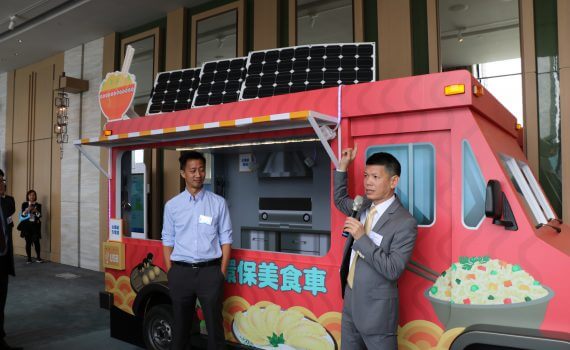News

Hong Kong's first solar-powered food truck wins catering award
- 2017-11-07
- Health & Environment
- The Young Reporter
- By: Holly Chik、Michelle NgEdited by: Choy York Borg Paulus
- 2017-11-07
Hong Kong's first green food truck won the Gold Prize of Catering in Traditional Cuisine of CLP's Greenplus Award Programme. The solar-power panels, which cost over $20,000, are installed on the vehicle's roof to supply electricity for fans and for customers to charge their electronic devices. "The eye-catching panels also demonstrates the eco-friendliness of the vehicle whereas other energy-saving measures are usually not obvious," said Trevor Ng, Managing Director of Pat Chun, who has been operating the $800,000 truck since March this year. The company also adopts an energy management system which can be operated with a smartphone to improve energy efficiency. "With the system, we can collect real-time energy consumption data and adjust the use of electricity," said Ng. For example, they can use the remaining heat generated by the automatic rice-fryer to cook their stewed beef brisket. To reduce interior temperature, they opted for a heat-resistant automatic rice-fryer. The solar panels on the roof also serve as a heat barrier during hotter days. A centrifugal range hood and a grease trap are also installed to collect used cooking oil that will be converted to biodiesel for the car. Ng said they save about 25% on their electricity bill after implementing these measures. Such environmental protection measures "mitigate climate change, lower business cost and create new business opportunities," said Philip Yung Wai-hung, Permanent Secretary for Commerce and Economic Development (Commerce, Industry and Tourism).

Two out of 40 prepackaged juices found to contain mycotoxin
- 2017-10-17
- Health & Environment
- The Young Reporter
- By: Holly ChikEdited by: Daisy Lee
- 2017-10-17
Consumer Council said two of prepackaged juices samples were tested positive for patulin, a mycotoxin a UN committee on Food Additives say could suppress immunoreactions, damage nerves and affect the development of infants. Although patulin is commonly present in decaying fruits, especially apples, "the risk is higher in juices because mould cannot be seen", said council spokesman Michael Hui King-man. The distributors have instantly removed the two cold pressed apple and blended apple juices, in which the amount of patulin have exceeded the Centre for Food Safety's action level. The council also found that the dietary fibre content of all 40 samples, including those with fruit pulps claims, was lower than the detection limit of less than 1.1g/100ml of fruit juice. Vitamin C content in apple juices was also found generally lower than 2mg/100ml, whilst that in orange juices, on the whole, was higher, ranging from 11 to 52mg/100ml. High sugar content in all samples also entailed that they are "not deemed as a low-sugar food" under Hong Kong's current nutrition labelling standards. For the sample with the most sugar, drinking 1 bottle of 360ml of juice would amount to 46g of sugar intake. In other words, it is equivalent to 92% of an adult average daily intake of 50g free sugars limit. The council urged consumers not to substitute fruit juice for fruit because juices contain less vitamin C and fibre but are more expensive. Reported by Holly Chik Edited by Daisy Lee








